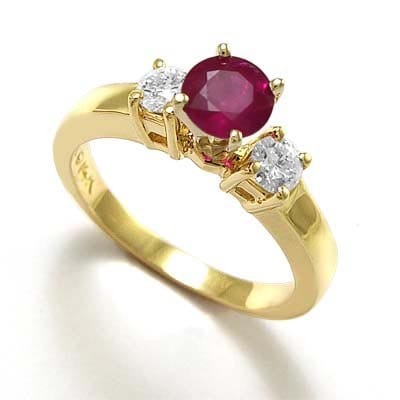Ruby
Ruby originated from Burma which is known today as Myanmar and dates back to 6th century during the Shan dynasty. The Mogok mines were taken over by Burma’s king in 1507 and gems that are from this mines are valued today as the highest quality and can be more expensive than diamond. Today the main country producing this gem is Sri Lanka and Thailand. Ruby is known for its hardwearing qualities following diamond. It is part of the corundum group of gems and has variety tones of reds, pinks, purplish and reddish browns. Some rubies are given the heat treatment to enhance the colour which is permanent also it can be given the oil treatment. All treatment must be declared by jewellers.

Ruby is called one of the precious stones created by god in the bible and in the ancient language of Sanskrit ruby was called “ratnaraj” or king of precious stones. Ruby is thought to have powers of life and wards of misfortune and ill health. Ruby is desired today as it always has been, it is a symbol of passion and makes it an ideal romantic gift for loved one. Traditionally reddish tones was set in yellow gold and have both the gem and gold dazzle. However in modern jewellery it is set with white gold and platinum to give it the contemporary look.

The common cut for ruby is ovals and cushions although it can be cut in any shapes. Rubies over 1 carat is a rare find therefore price increases greatly with the size. Rubies are used in variety of fine jewellery from art deco styles to contemporary. Ruby is the birthstone for July and used for 40th and 80th wedding anniversaries. There are synthesized rubies so be careful when purchasing a ruby, only an expert can tell between a natural and man-made therefore always use a professional jeweller.
Ruby Care
Ruby is very tough and durable gemstone however it needs to be cared for so that its brilliance doesn’t fade. Ruby should be stored in a soft pouch or jewellery box to prevent scratching and damage from or to other jewellery. Soap and liquid cleaners should be avoided as these may cause ruby to dull. Harsh detergents or chemicals such as bleach or chlorine should be avoided as these could cause erosion to the gemstone. To clean ruby rinse thoroughly with water and dry with a soft jewellery cloth.